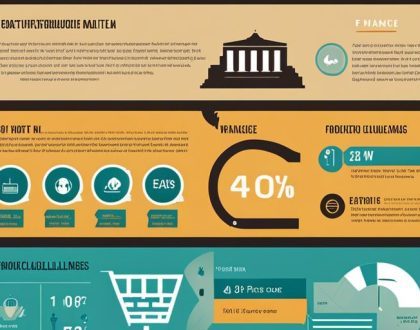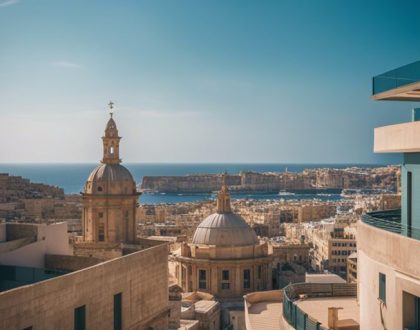Managing Finances in Malta – Tips & Tricks

Many individuals face challenges when it comes to managing their #finances, especially in a diverse and vibrant country like #Malta. This informative blog post will provide you with imperative tips and tricks to help you navigate the financial landscape in Malta with confidence. From understanding taxation laws to maximizing your savings, we will cover the most important aspects of managing your finances in this Mediterranean gem.
Understanding the Maltese Financial Landscape
Before delving into managing finances in Malta, it is necessary to understand the financial landscape of this Mediterranean archipelago. The Maltese financial system boasts a strong and stable economy, making it an attractive destination for investors and businesses alike. With a strategic location, a skilled workforce, and a diverse range of sectors contributing to its GDP, Malta has positioned itself as a competitive player in the global market.
Key Economic Indicators in Malta
Maltese economic indicators play a crucial role in assessing the country’s financial health and potential for growth. Some key indicators include GDP growth rate, unemployment rate, inflation rate, and trade balance. Malta has consistently shown positive figures in these areas, with a robust GDP growth rate and a relatively low unemployment rate. However, rising inflation and trade imbalances pose potential challenges that need to be carefully monitored and managed to ensure continued economic stability.
The Regulatory Framework and Financial Institutions
Financial institutions in Malta operate within a well-established regulatory framework overseen by the Malta Financial Services Authority (MFSA). This regulatory body ensures that financial institutions adhere to strict guidelines and standards to maintain the integrity and stability of the financial sector. Malta’s reputation as a reputable financial center is bolstered by the stringent regulations in place, providing a secure environment for businesses and investors.
One notable aspect of the regulatory framework in Malta is the country’s strong commitment to combating money laundering and terrorist financing. Financial institutions are required to implement robust Know Your Customer (KYC) procedures and transaction monitoring mechanisms to prevent illicit activities within the financial system. This proactive approach aligns with international standards and enhances Malta’s credibility as a trustworthy financial jurisdiction.
Opening and Managing Bank Accounts
Choosing the Right Bank in Malta
An important aspect of managing your finances in Malta is selecting the right bank to entrust with your money. Consider factors such as fees, customer service, branch availability, and online banking options when deciding on a bank. It is advisable to research different banks and their offerings before making a decision.
Documentation and Requirements for Account Opening
With the aim of opening a bank account in Malta, certain documentation and requirements must be met. Be prepared to provide proof of identity, proof of address, and possibly a reference from another bank. Non-residents may face additional requirements, so it is beneficial to inquire with the chosen bank beforehand.
Managing your finances in Malta requires adhering to the local regulations and providing the necessary documentation to open a bank account successfully. Failure to comply with these requirements may result in delayed account opening or, in some cases, rejection.
Online Banking and Mobile App Facilities
Online banking and mobile app facilities are necessary tools for efficient financial management in Malta. Most banks in Malta offer secure online banking platforms and user-friendly mobile apps to help you monitor your accounts, transfer funds, pay bills, and access a range of banking services conveniently from your electronic devices.
Online banking and mobile app facilities provide flexibility and convenience, allowing you to manage your finances anytime, anywhere. Ensure you set up secure login credentials and regularly monitor your accounts for any unauthorized activity to safeguard your financial information.
Personal Finance Tips for Residents
Budgeting and Saving Strategies
Budgeting is important for managing your finances effectively as a resident in Malta. Start by outlining your monthly income and expenses to create a budget that aligns with your financial goals. Consider using online tools or apps to track your spending and identify areas where you can cut back.
- Set aside a portion of your income for savings or emergency funds to cover unexpected expenses.
- Limit unnecessary expenses such as dining out or shopping to stay within your budget.
The key to successful budgeting and saving is discipline and consistency. By prioritizing your financial well-being, you can build a strong foundation for future financial stability.
Taxation in Malta: What You Need to Know
Saving on taxes is crucial for maximizing your income as a resident in Malta. Familiarize yourself with the tax laws and regulations in the country to take advantage of any available deductions or credits. Consult with a tax professional to ensure you are fully compliant with Maltese tax laws.
Residents in Malta are subject to various taxes, including income tax, property tax, and value-added tax (VAT). Understanding your tax obligations can help you minimize your tax liability and optimize your financial planning strategies.
Retirement Planning and Pension Schemes
For residents in Malta, planning for retirement is critical to ensure a comfortable and secure future. Explore various pension schemes and retirement options available in Malta, such as personal pension plans or occupational pension schemes. Evaluate the contribution rates, investment options, and projected returns to choose the best retirement plan for your needs.
One of the most important aspects of retirement planning is starting early and consistently saving for retirement. By contributing to a pension scheme regularly, you can build a substantial nest egg and enjoy a financially stable retirement.
Business Financial Management
Once again, managing the finances of a business in Malta requires careful planning and strategic decision-making. In this chapter, we will explore into key aspects of business financial management that are crucial for success in the Maltese market.
Starting a Business in Malta: Financial Considerations
Business owners looking to start a business in Malta must consider several financial aspects before plunging into the market. Understanding the costs involved, such as the initial setup, registration fees, and ongoing operational expenses, is important. It is also important to have a clear business plan that outlines the revenue streams, potential profits, and cash flow projections to ensure sustainability.
Accounting and Bookkeeping Best Practices for Maltese Companies
Financial stability is at the core of every successful business, and proper accounting and bookkeeping practices play a crucial role in achieving this stability. Keeping accurate records of all financial transactions, maintaining up-to-date financial statements, and complying with Maltese accounting standards are imperative. Additionally, leveraging accounting software and hiring professional accountants can streamline the process and provide valuable insights into the financial health of the business.
It is recommended to conduct regular audits to identify any discrepancies and address them promptly. By having a robust accounting and bookkeeping system in place, businesses can make informed decisions, track performance effectively, and ensure compliance with regulatory requirements.
Understanding VAT and Other Business Taxes
Other than income tax, Value Added Tax (VAT) is another crucial aspect of business taxation in Malta. Businesses must register for VAT if their annual turnover exceeds a certain threshold. Understanding the VAT rates, exemptions, and filing requirements is important to avoid penalties and maintain compliance. Moreover, being aware of other business taxes, such as stamp duty, social security contributions, and environmental taxes, is vital for proper financial planning and budgeting.
Management of VAT and other business taxes requires meticulous record-keeping, timely submissions, and adherence to reporting deadlines. Seeking professional advice from tax experts can help businesses navigate the complex tax landscape in Malta and optimize their tax obligations. Staying informed about tax legislation updates and leveraging tax incentives can further contribute to the financial success of a business in Malta.
Investment Opportunities in Malta
To make informed decisions on investment opportunities in Malta, it is crucial to understand the various options available and the potential risks involved. Real estate is a popular choice for investors in Malta due to the steady increase in property values over the years.
Real Estate Investment: Prospects and Pitfalls
Investment in real estate can offer a stable source of income through rental yields and capital appreciation. Malta’s strong economy and growing tourism industry make it an attractive destination for property investment. However, it is crucial to conduct thorough research on market trends, property location, and legal requirements to mitigate potential pitfalls. One major benefit of real estate investment in Malta is the opportunity for residency or citizenship through the Individual Investor Programme.
The Stock Market and Financial Instruments
The Malta Stock Exchange provides opportunities for investors to diversify their portfolios through trading in various financial instruments such as stocks, bonds, and derivatives. Investors should carefully assess their risk tolerance and investment goals before participating in the stock market. While investing in stocks can yield high returns, it also carries a significant level of risk. It is advisable for investors to seek professional advice from financial advisors or brokers to navigate the complexities of the stock market.
Financial literacy and understanding of market dynamics are crucial for success in stock market investments. Investors should stay informed about global economic trends and company performance to make informed investment decisions. It is important to diversify the investment portfolio to minimize risks and maximize returns in the volatile stock market environment.
Innovative Investment Schemes in Malta
The Maltese financial sector offers innovative investment schemes such as the Malta Enterprise Investment Scheme (MEIS) and the Malta Stock Exchange’s Prospects MTF platform. These schemes provide opportunities for investors to support local businesses and startups while benefiting from tax incentives and potential returns.Investors interested in participating in these schemes should carefully evaluate the eligibility criteria and the associated risks before committing capital.
Market research and due diligence are crucial when exploring innovative investment schemes in Malta. Investors should assess the credibility and track record of the scheme operators and seek independent financial advice to make informed decisions. By staying informed and prudent in their investment choices, investors can capitalize on the diverse opportunities available in the Maltese market.
Expatriate Finance
Financial Tips for New Expats in Malta
All expatriates moving to Malta should prioritize understanding the local financial landscape. It is crucial to open a local bank account to easily manage day-to-day expenses and recurring bills. Additionally, familiarize yourself with the taxation system in Malta to ensure compliance and avoid any potential penalties or fines. Seeking guidance from financial advisors who specialize in expatriate finances can provide valuable insights and assistance in navigating the process smoothly.
- Research local banking options and choose one that aligns with your financial needs
- Understand the tax implications of earning income in Malta and seek professional advice if needed
- Build a financial cushion for unexpected expenses or emergencies
Knowing how to effectively manage your finances as an expatriate in Malta will help you establish a solid financial foundation and enjoy a smooth transition into your new life abroad.
International Banking and Wealth Management
Expats in Malta may benefit from international banking and wealth management services tailored to their unique needs. International banks in Malta offer a range of products and services designed to cater to expatriates, including multi-currency accounts, investment options, and wealth management solutions. These institutions often have expertise in handling cross-border transactions and providing personalized financial advice to help expats grow and protect their wealth.
Expats looking to maximize their financial opportunities and secure their assets can explore international banking and wealth management options in Malta. By partnering with reputable financial institutions, expatriates can receive comprehensive financial solutions and expert guidance to plan for their future with confidence.
Handling Currency Exchange and Transfer Services
Handling currency exchange and transfer services efficiently is crucial for expatriates in Malta to manage their international transactions seamlessly. Utilizing reputable currency exchange providers or international banking services can help expats secure competitive exchange rates and lower transfer fees. It is crucial to stay informed about currency fluctuations and market trends to make informed decisions when exchanging or transferring funds.
Exchange currency exchange and transfer services play a significant role in expatriate finance, impacting the cost and efficiency of international transactions. By being proactive and strategic in handling currency exchanges, expats can maximize their financial resources and mitigate risks associated with fluctuations in exchange rates.
Risk Management
Not actively managing risks can lead to financial instability and stress. By implementing effective risk management strategies, individuals can protect their finances and achieve peace of mind.
Insurance Options in Malta
On their journey towards financial security, individuals in Malta can consider various insurance options to protect against unexpected events. This may include health insurance, life insurance, property insurance, and car insurance. By investing in suitable insurance policies, individuals can mitigate the financial impact of emergencies and accidents, ensuring they can focus on their long-term financial goals.
Protecting Against Financial Fraud and Scams
Financial fraud and scams pose a significant threat to individuals’ finances in Malta. Not staying vigilant can result in substantial financial losses and damage to one’s reputation. Therefore, it is crucial to stay informed about common fraud schemes and take proactive measures to protect personal and financial information. By staying alert and utilizing security measures such as two-factor authentication and secure payment gateways, individuals can safeguard their finances from malicious activities.
Financial scams often target individuals through email phishing, fraudulent investments, and identity theft. It is vital to stay cautious and skeptical when receiving unsolicited requests for personal information or investment opportunities. By conducting thorough research and seeking advice from financial professionals, individuals can reduce their vulnerability to financial fraud and scams.
Conclusion
Summing up, managing finances in Malta can be made easier by following these tips and tricks. It is important to create a budget and stick to it, prioritize saving for emergencies, and take advantage of tax incentives and investment opportunities available in the country. By being mindful of your spending, staying organized, and seeking professional advice when needed, you can effectively manage your finances and secure a stable financial future in Malta.
Note, financial planning is a key aspect of achieving your goals and ensuring financial stability. By implementing these strategies and practicing good money habits, you can navigate the financial landscape in Malta with confidence and make informed decisions that will benefit your financial well-being in the long run. Stay disciplined, stay focused, and enjoy the peace of mind that comes with having your finances under control.
FAQs
What are the key economic indicators to monitor in Malta?
Key economic indicators include GDP growth rate, unemployment rate, inflation rate, and trade balance. Monitoring these helps assess Malta’s financial health and growth potential.
How do I choose the right bank in Malta?
Consider factors like fees, customer service, branch availability, and online banking options when selecting a bank in Malta. Research different banks to find one that meets your needs.
What are the documentation requirements for opening a bank account in Malta?
Documentation typically includes proof of identity, proof of address, and sometimes a reference from another bank. Non-residents may have additional requirements.
What are the benefits of using online banking and mobile apps in Malta?
Online banking and mobile apps offer convenience for managing finances, including account monitoring, fund transfers, bill payments, and access to banking services anytime, anywhere.
What tax considerations should residents in Malta be aware of?
Residents in Malta are subject to income tax, property tax, and VAT. Understanding these taxes and seeking professional advice can help minimize tax liabilities.
Recommended Posts

Historical Tapestry of Malta
July 5, 2024

Starting a Finance Business in Malta
July 5, 2024

Malta’s Economic Strategy for Business
July 5, 2024




